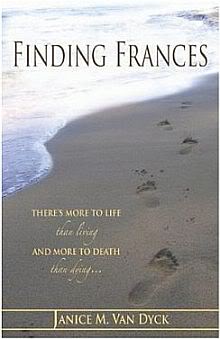 Synopsis:
Synopsis:
Frances Baldwin is seventy-four years old. She has known for quite a few months that she was nearing the end of her life. For many years, she enjoyed smoking, which has resulted in her suffering from emphysema and, more recently, COPD (chronic obstructive pulmonary disease), a progressive disorder which makes it difficult to breathe and for which there is no cure. Frances has decided that she does not wish to spend the rest of her life utilizing oxygen, gradually struggling harder and harder to breathe. Rather, she wants to die a dignified death and hopes to die peacefully in her sleep. She definitely does not want any extraordinary measures employed in order to prolong her life in the event that she suffers a medical crisis.
Frances experiences congestive heart failure and is hospitalized, but soon feels well enough to return home and resume her normal activities. Her relief is short-lived, however, when severe stomach pains send her back to the hospital and she is informed that a bowel obstruction will require immediate surgery in order to provide pain relief and offer her an opportunity to continue living even a moderately active life. Frances does not hesitate to decline the surgery, with the understanding that her refusal will bring about the end of her life. Her well-meaning hospitalist (the term used to describe the physician who oversees a patient’s treatment during hospitalization) is appalled and strives to change her mind, emphasizing that the surgery could allow her to return home and enjoy several more productive years.
And then the doctor drops a bombshell. Frances’s health insurance will cover the cost of surgery and recuperation in the hospital, but it will not pay for hospice care should Frances opt not to undergo surgery. Worse, the hospital will not allow Frances to remain there — she will have to be discharged and pay for costly in-home treatment herself or move to a skilled nursing facility, an even more expensive option. Frances reluctantly agrees to the surgery.
The doctors’ rosy predictions are, of course, erroneous, and the surgery is not successful. Once again, Frances finds herself at a crossroads, having to decide about her own course of treatment and future. The second time, Frances sticks to her guns and the hospital arranges for hospice care in the facility. Relieved to be free from tubes, monitors, and procedures, Frances settles in, at peace and ready to die.
Frances’s family gathers around her: Bill, her husband; William, her oldest son, leaves his wife and job to remain at Frances’s side for the duration; daughter Sugar; and youngest son Randy, en route from New York to a new job in Salt Lake City, stays only briefly before Frances tells him to leave and get on with his life transition. Each of her family members reacts differently to Frances’s illness and the decisions she makes.
Finding Frances is the story of how Frances determines her own fate, and what her family learns about her and, more poignantly, themselves, during her journey from life to a good death.
Review:

I am one of the few people on this planet who truly understands what I mean by the phrase “epic battle” because I litigated Conservatorship of Wendland here in California for more than six years. In that case, Robert Wendland was catastrophically brain-injured and left no advance medical directive. He could not speak for himself. His wife disagreed with other family members, primarily his mother, about Robert’s wishes. When his wife opted to direct Robert’s physicians to remove the tube through which he received life-sustaining food and fluids, thereby beginning the process of dying, Robert’s mother and sister retained me to intercede and prevent that from happening. Little did I know that the legal battle would rage on for so long, during which a protracted Superior Court trial would be examined by the Court of Appeal and, eventually, the California Supreme Court.

Finding Frances was inspired by author Janice M. Van Dyck’s own experience dealing with her mother’s death. Her mother specifically requested that one of her family members write about their ordeal. Additionally, Van Dyck followed the case of Terri Schindler-Schiavo closely. (I consulted with the Schindler family and their attorneys in an effort to help them save Terri.) That case also dragged on for many years before ending with Terri’s tragic death.
Set in 2005, the story of Frances Baldwin does encompass end-of-life decision-making. However, unlike Robert Wendland or Terri Schindler-Schiavo, Frances is capable of articulating her desires and she does so emphatically. It is necessary that Frances speak firmly and repeatedly, as her care providers try to convince her to undergo surgery in an effort to prolong her life. The real question for Frances remains, however, whether her physicians can provide her with the quality of life she finds acceptable.
The focus and lesson to be learned from Frances Baldwin’s story is not about the process of deciding what course of medical treatment, if any, is appropriate. As noted above, Frances makes her own mind up early in the book about what she wants. The medical treatment community is fairly quickly convinced, and her caregivers accede to her wishes. Thus, the story’s major focus is on the process of dying a dignified, emotionally-fulfilling death, and the lessons that Frances teaches her family as she forges ahead with her plan to depart this world on her own terms.
As I was losing [my mother], I was finding new aspects of myself and my relationship with her. This was the genesis of the title. In the end, it’s about what was found, not what was lost.~ Author Janice M. Van Dyck
Frances enlists her oldest son, William, to assist her in securing the kind of death she wants. William nearly completed medical school, but dropped out just short of graduation because of the ambiguities inherent in the practice of medicine. His wife completed her education and is a practicing dermatologist, but William retreated to a career in computer networking where outcomes are predictable and certain. William is, at first, deeply conflicted about his mother’s request because he is not ready to let go of her. Eventually, however, he comes to understand that he must respect her desires and take all steps requisite to ensuring that her death is as she wishes it to be. Through fictional journal entries composed by William as he experiences his mother’s process of dying, Van Dyck explores the overarching sociological issues implicated in the storyline, as William wrangles with his own emotions, his realizations about why he could not bring himself to become a physician, and the status of his marriage. At one point, William tells his wife, Diane, that he does not understand how his mother can give up the fight to live so easily, so willingly, walking “into death as if it is her savior instead of her slayer.” Still, he knows that he must do what his mother has asked of him.
“But how can I deny her? She gave me life in the first place, and now she asks me to let go of the only part of me I have ever known for certain.” He came to the core of the truth, and it had already begun burning him in its heat. “I’ve struggled for years to find myself, Di. Yet she’s always been there, a constant. We are each other. I’ve been trying to find what part of myself exists outside my mother.”
Middle child Sugar is also deeply disturbed by her mother’s request, and she fights against her mother’s certain demise. Like William, her feelings are deeply rooted in her own need to continue the close relationship she shares with her mother, and keep her children connected to their grandmother. Gradually, however, Sugar’s maternal instinct allows her to gently and compassionately care for her mother during her final days.
Randy, the youngest, has been estranged from the family for many years, but he comes home for one final visit with his mother. Avoidance has been the method he has employed to deal with his family’s issues. So his visceral and dramatic reaction to the certain knowledge that he will not see his mother alive again surprises him more than anyone. And transforms him.
And Bill, who met and fell in love with Frances back in 1949, learns that his wife can still surprise him, even after so many years and so much life lived together. He hopes for a miracle — a sudden healing that will end the nightmare he is living as the wife he loves in spite of everything that has transpired between them gradually slips away from him. With the assistance of his oldest son, Bill realizes that his role in his wife’s death is both critical and unique — and he cannot abdicate his part in it.
The truth is, of course, that the death of a loved one must be about that individual’s needs, desires, and best interests. But the death is also very much about and plays an important role in the lives of the survivors. William recognizes and acknowledges that, noting in his journal that “her death is about me, after all. Her death is about my life. When she is gone, I will be a portion of who I was. I will be reborn without a mother. No more protector, no more excuses. I will finally be responsible for my own life. And I will be closer than ever to losing what remains.”
Finding Frances is a heartfelt, deeply moving story about the journey that we all take from cradle to grave, the quality of our relationships with each other, and the various ways in which we can help ourselves and our loved ones to have a truly good death. Van Dyck’s writing style is straight-forward and honest, and the characters she has created represent typical viewpoints and personality types. They are fully developed, empathetic, and their voices ring true. Most importantly, Van Dyck has written a decidedly uplifting story about a woman who knows her own mind and values, and the family members who come to realize that they love and respect her enough to let her go.
Disclosure of Material Connection: I received one copy of Finding Frances free of charge from the author in conjunction with the PR By the Book review and virtual book tour program. I was not required to write a positive review in exchange for receipt of the book; rather, the opinions expressed in this review are my own. This disclosure complies with 16 Code of Federal Regulations, Part 255, “Guides Concerning the Use of Endorsements and Testimonials in Advertising.”
Enter to Win a Copy of Finding Frances
One lucky reader, selected at random, will receive a copy of Finding Frances, graciously supplied by the author.
To enter, simply post a comment explaining why you would like to read Finding Frances. Be sure to include your email address (for notification and delivery purposes). The book can only be shipped to a United States address (no P.O. box).
The comment posted by Karen Kukrak was selected at random, so a copy of Finding Frances was sent to her!



22 Comments
I want to read this because I just found out my 59 year old brother has COPD. I’m hoping this book can give me a little help.
mamabunny13 at gmail dot com
My grandma died about a month ago due to COPD. I’m hoping that this book will help my grandpa. Thank you! edysicecreamlover18@gmailDOTcom
Sounds like an amazing book, please enter me.
This sounds like a book I would be interested in reading. Please enter me. Thank you so much for this giveaway.
sassysasha817 at gmail dot com
This is such an important issue, and Finding Frances sounds like an excellent, readable treatment of the topic. I’d love to win and read this one.
Thanks for a great review.
tbranco2 AT gmail DOT com
I would love to read this because I enjoy stories about families
I have a cousin who has COPD so I am very interested in this book. I love that you said that the story is straight forward and honest.’
CarolNWong(at)aol(dot)com
This book sounds amazing. I love to read books that deal with these types of decisions. As a psychology major, I find it fascinating to see what perceived reactions should be as compared what they really are, if that makes sense. Please sign me up.
stimble(at)hotmail(dot)com
I am self-employed and have to buy insurance through my husband’s employer, which is very costly. This concern raised in Finding Frances touches us all. We have to consider our families and our life paths in decisions like Frances faces because we all face some of them eventually. I would love to read about her journey!
dz59001[at]gmail[dot]com
This subject is close to my heart. 🙂
Oh this sounds so SAD!!! I’d love to read it and see exactly how they came to the conclusion that they have to let her go. This is just breaking my heart :'(
This is a book that treats a very real topic. I’d like to read it.
Right now I have a relative with c-diff and live day to day,
I would like to read this book,
This is a subject we can all use some insight on. Thank you for the contest.
Digicats {at} Sbcglobal {dot} Net
This sounds like a heart-felt family drama. The insurance issue would be an interesting battle. Thanks for the giveaway.
I’d like to read Finding Frances because it is a poignant story of a family that finds life while facing death & tackles some important issues that will one day impact us all. Definitely not an easy read but a provocative and necessary one not to be missed! Thanks for a chance to win this wonderful book!
The book sounds very good. I was recently diagnosed with COPD. This sounds like something I could really use.
sharon54220@gmail.com
This book sounds very interesting and heartfelt. I hope I win. 🙂
nicnac63@hotmail.com
http://cehart.blogspot.com
I am a nurse and I see these situations frequently. I would love to read Frances’s story.
Pingback: West Of Mars — Win A Book! » Blog Archive » Finding Frances
My mom passed away a year ago after a hip replacement surgery. She deteriorated rapidly but maintained her mental status til the end. She did not want to linger or be kept alive artificially. I understood and respected that and had to help the rest of the family to accept her wishes. By the time she passed away, everyone was comfortable with the issue. We have always been able to talk easily about her since. We celebrated her on Mother’s Day this year.
lkish77123 at gmail dot com
Pingback: Saturday Review of Books: June 4, 2011 | Semicolon